The Israel Antiquities Authority announced on Friday that an inscription on an ancient shard uncovered in southern Israel, which it attributed earlier in the week with much fanfare to the Persian King Darius the Great, is not authentic.
On March 1, the state-run archaeological body reported that the discovery of the 2,500-year-old fragment, which visitors found in December at the Tel Lachish national park, was the first bearing an inscription with Darius the Great’s name anywhere in Israel.
The scholar accidentally left the shard on the site, leading to the erroneous identification, per the statement.
“The IAA takes full responsibility for the unfortunate event,” stated Gideon Avni, IAA chief scientist. He noted that a “leading” researcher and an archaeologist studying the site examined the piece. “As an institution that strives for the scientific truth, we are committed to correcting the mistake that was made and making it known to the public.”
“In terms of ethical and scientific practices, it was a very severe occurrence. Leaving the newly inscribed sherd on the site was careless, and led to the mistake done by the researchers and distorted the scientific truth,” he stated. “This once again proves that only finds discovered in controlled archaeological excavations should be considered 100% authentic. All other finds should raise questions regarding their authenticity.”
The Israel Antiquities Authority said that it will refresh proper procedures and policies with all foreign expeditions working in the country.
The site of the find, the ancient city of Lachish, was a prosperous city and a major administrative hub 2,500 years ago.


























